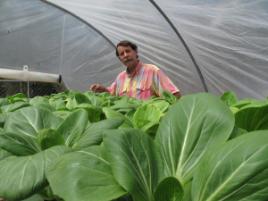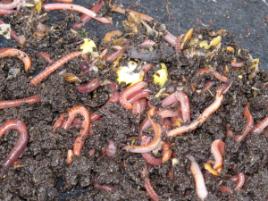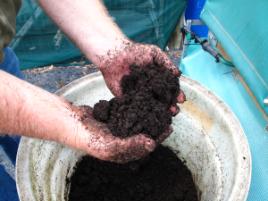Worms to be main player in recycling revolution
Published on 14 September, 2009
Queensland researchers are ‘worming' their way to the forefront of the recycling revolution.
A CQUniversity team, lead by Director of Plant of Water Sciences Professor David Midmore, is working on a recycling process that transforms urban kitchen scraps into nutrient-rich, organic food for both fish and plants.
The system, titled vermiaquaponics by the researchers, involves worms being fed kitchen scraps and composted abattoir by-products (vermiculture) creating a rich liquor (vermiliquor) that can be used to feed hydroponic plants.
Professor Midmore said the system could enable urban dwellers to help grow our rural plant industries by subsidising the fertilization process.

Professor David Midmore shows off the produce being boosted by the vermiliquor.He said it will also cut the ever growing amount of landfill our cities create.
"I have read that every Australian person produces a tonne of organic waste a year - about 3kg a day.
"By recycling even one half of this organic waste and producing food we can definitely reduce the load on landfills."
Professor Midmore forecasted this type of system could find its way into city dweller's homes, and food outlets, in the form of roof-top urban gardens with scraps providing the nutrients for roof-top hydroponically-produced vegetables.
This system could also revolutionise the way urban restaurants dispose of their waste.
"What an attraction for eco-restaurants - choose your vegetables and fish not only off the menu, but out of tanks and hydroponic set-ups, and all grown on recycled 'wastes'. Remember, 'wastes' are resources for which we still have not found a use!"

Worms feed on kitchen scraps.The aquaculture industry could also reap the benefits of this system. The growing worm populations could provide the aquaculture industry with a highly nutritious food source.
The worms are high in protein and high in omega 3, providing an excellent combination of nutrients for fish.
Trials are currently underway with Australia's Eel Tail Catfish (Tandanus Tandanus), which for many is one of the finest fresh water fish to plate.


